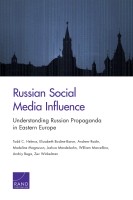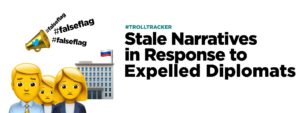
EU Stratcom Task Force
Group of Seven countries will set up a special group to examine Russia’s “malign behavior,” including its assassination attempts on foreign soil, cyber warfare activities and disinformation campaigns, British Foreign Secretary Boris Johnson announced today.
“Russia is so unbelievably clever at kind of sowing doubt and confusion and spreading all this fake news and trying to muddy the waters. So we think there’s a role for the G7 in just trying to provide some clarity about what we all collectively think the Russians are doing in terms of malign behavior,” Mr. Johnson said.
The G7 discussions will focus on the prevention of violent extremism online and offline, building resilience against the cyber threat and new forms of hybrid warfare, disinformation, and reinforcing democracy, amongst other issues.
Some Western-based non-profits are ‘echoing’ Russian disinformation, observers suggest.
 One group is “putting out content that was clearly anti-immigrant, anti-Muslim and was echoing some of the Russian disinformation propaganda” being spread by internet trolls and on social media, said Alina Polyakova (left), a Brookings Institution fellow who studies far-right populism and disinformation campaigns in the European Union.
One group is “putting out content that was clearly anti-immigrant, anti-Muslim and was echoing some of the Russian disinformation propaganda” being spread by internet trolls and on social media, said Alina Polyakova (left), a Brookings Institution fellow who studies far-right populism and disinformation campaigns in the European Union.
Russia’s social media campaign in the Baltics, Ukraine and nearby states aims to sow dissent against neighboring governments, as well as NATO and the European Union, according to a recent RAND Corporation report:
In addition to employing a state-funded multi-lingual television network, operating various pro-government news websites and working  through Russian-backed “civil society” organizations, Russia also employs a sophisticated social media campaign that includes news tweets, non-attributed comments on web pages, troll and bot social media accounts, and fake hashtag and Twitter campaigns.
through Russian-backed “civil society” organizations, Russia also employs a sophisticated social media campaign that includes news tweets, non-attributed comments on web pages, troll and bot social media accounts, and fake hashtag and Twitter campaigns.
“Nowhere is this threat more tangible than in Ukraine, which has been an active propaganda battleground since the 2014 Ukrainian revolution,” said Todd Helmus, lead author on the report. To counter the Russian campaign, Western countries need to offer alternative television, social media and other media to help displace the Russian narrative, the report notes, alongside a number of other recommendations:
- Highlight and “block” Russian propaganda (RP).
- Build the resilience of at-risk populations. Introduce media literacy training in the education system to help Russian colinguists and others in the region better identify fake news and other propagandist content. Consider launching a public information campaign that can more immediately teach media literacy to a mass audience.
- Expand and improve local and original content to displace the Russian media narrative. Empower social media and other activists in the region by identifying key influencers and offering a series of programming geared to enhance their influence potential. Train journalists and fund the creation of alternative media content.
-

DFRLab
Better tell the U.S., North Atlantic Treaty Organization (NATO), and European Union (EU) story. The United States, NATO, and EU should offer a compelling argument for populations to align with the West or with individual nation-states. …
- Track Russian media and develop analytic methods. Identify fake-news stories and their sources, understand Russian narrative themes and content, and understand the broader Russian strategy that underlies tactical propaganda messaging. In addition, use resonance analysis to track the impact and spread of RP and influence.
“We paid special attention to the role of non-attributed social media accounts, which are frequently, but not solely, employed on Twitter and Facebook,” said Elizabeth Bodine-Baron, co-director of the RAND Center for Applied Network Analysis and System Science. “Russia has established that during critical moments, such as during the Ukrainian conflict, it can flood news websites with tens of thousands of comments each day.” RTWT







